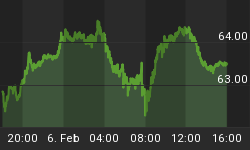Marc Faber, publisher of the Gloom, Boom & Doom Report spoke to Bloomberg TV's Lisa Murphy and Adam Johnson and said that U.S. equities are not "terribly expensive" and that he thinks the euro will survive.
Faber on his latest report:
"It's actually quite gloomy but if you're very gloomy what do you invest in: Treasuries, Italian bonds or commodities or equities? I happen to think U.S. equities are not terribly expensive, so relatively speaking to other assets, they may for a while actually do quite well."
On the market now:
"Right now, the market is in neutral territory. It was very oversold on October 4th when the S&P dropped to 1,074. Now around 1260, the upside in my opinion will be between 1,280 and 1,350 because there's a lot of supply around that area. But if there is some good news coming out of Europe, and good news would simply mean postponing the problems for another few years with some kind of money printing operation, either by that ECB or IMF or EFSF, [that] lift stock prices higher."
"[Postponing problems] is not good news, but it is better news than if the whole eurozone falls apart. It gives some time to maybe find better solutions. I doubt they will be found, but with money printing you can hide a lot of things and you can postpone problems as we have seen in the U.S."
On the outlook for the euro:
"I think the euro will survive, the question is in what form. It may survive without the weaker countries or it could survive theoretically just as a currency aside from local currencies. You would have in France and Italy and Spain and Greece, local currencies and...the dollar. So, I could travel anywhere in Europe and still pay in euros."
On whether he'd rather own euros or dollars:
"I have a very special stock tip for you. The symbol is g-o-l-d. That is what I prefer to hold. Both the euro and the dollar are long-term undesirable currencies, especially given zero interest rates in the U.S. Equities to some extent become like cash because they become a store of value compared to cash at a zero interest-rates. Paintings become a store of value, stamps become a store of value."
On emerging markets:
"There is close correlation between all markets in the world. This year, the U.S. has grossly outperformed the emerging markets In Asia, we're down between 15% and 25% in markets. In Eastern Europe, even more. The U.S. this year is a wonderful market relative to the rest of the world. "
"I think this outperformance may go on for a while. Some emerging markets could rebound more strongly than the U.S. because they are more oversold. Like India, the currency is down 18% since July and the market is down 22%. Currency adjusted, the market has been extremely weak and is oversold. It could rebound somewhat here, but forget about new highs. It's not going to happen anytime soon."
On China:
"The reason I'm not very keen on China at the present time [is because] we had a credit bubble, we still have artificially low interest rates and a huge fiscal deficit in orders words artificial stimulus. That's coming to an end. Yes, the government can further stimulate and slash interest-rates again and reduce reserve requirements, but it will just postpone the problem and aggravate the problem in my opinion."
"When you have an economy like China that becomes so big so quickly, you can have a more meaningful setback. If the U.S. economy grows at 3% or contracts that 3%, it has no impact on the price of copper to speak of....In the case of China, whether the economy grows at 10% or 5% as a huge impact on the demand for iron ore and copper and aluminum, steel and coal. The Chinese economy today has a much larger impact on the rest of the world than is generally perceived economically speaking."















